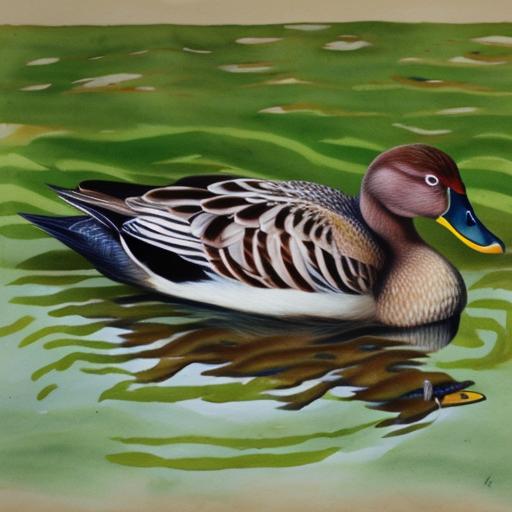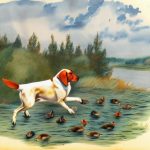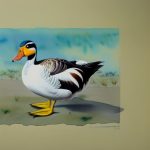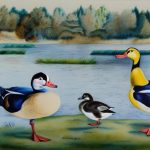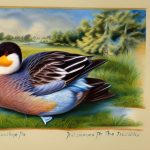The Cayuga duck is a domestic breed of duck that originated in the United States. It is believed to have been developed in the early 19th century in the area around Lake Cayuga in New York. The breed was named after the lake where it was first developed. The exact origins of the Cayuga duck are not well-documented, but it is believed to be a cross between the wild Black Duck and a domestic duck breed. The Cayuga duck was first recognized by the American Poultry Association in 1874 and has since become a popular breed for both meat and egg production.
The Cayuga duck is known for its beautiful iridescent green-black plumage, which sets it apart from other duck breeds. It is also known for its calm and friendly temperament, making it a popular choice for backyard duck enthusiasts. The breed has also been used in conservation efforts to preserve genetic diversity in domestic duck populations. Overall, the Cayuga duck has a rich history and continues to be a beloved breed among duck enthusiasts.
Key Takeaways
- Cayuga ducks originated in the United States in the early 19th century and are named after Cayuga Lake in New York.
- Cayuga ducks are known for their iridescent green-black plumage, which can appear almost black in certain lighting.
- Cayuga ducks are known for their calm and friendly temperament, making them great pets and suitable for families.
- Cayuga ducks require a balanced diet, access to water for swimming, and protection from predators to thrive.
- Cayuga ducks are prolific layers and can produce a large number of eggs, making them a popular choice for small-scale egg production.
Physical Characteristics of Cayuga Ducks
Cayuga ducks are medium-sized ducks with a distinctive iridescent green-black plumage that sets them apart from other duck breeds. Their feathers can appear black at first glance, but when they catch the light, they display a beautiful green sheen. This unique coloring is one of the most striking physical characteristics of the Cayuga duck. They have a medium-length, slightly concave bill and orange legs and feet. Their eyes are dark brown or black, adding to their mysterious and beautiful appearance.
In terms of size, Cayuga ducks are medium-sized, with drakes weighing around 7-8 pounds and hens weighing around 6-7 pounds. They have a broad, slightly elongated body with a well-rounded chest. Their bodies are well-proportioned, and they have a graceful and elegant posture. Overall, the physical characteristics of the Cayuga duck make it a visually stunning and unique breed that is highly sought after by duck enthusiasts.
Behavior and Temperament of Cayuga Ducks
Cayuga ducks are known for their calm and friendly temperament, making them an excellent choice for backyard duck enthusiasts. They are sociable birds that enjoy the company of other ducks and can also coexist peacefully with other poultry species. Cayuga ducks are also known for their gentle nature, making them a popular choice for families with children. They are not aggressive and are generally easy to handle and care for.
In addition to their friendly temperament, Cayuga ducks are also known for their foraging abilities. They are excellent foragers and enjoy spending time exploring their surroundings in search of food. This makes them well-suited for free-range environments where they can graze on grass, insects, and other natural foods. Overall, the behavior and temperament of Cayuga ducks make them a joy to have on the farm or in the backyard.
Care and Maintenance of Cayuga Ducks
Cayuga ducks are relatively low-maintenance birds, but they do require proper care to ensure their health and well-being. They should be provided with a clean and secure living environment that protects them from predators and the elements. This can include a well-ventilated coop or shelter with access to fresh water and a balanced diet. Cayuga ducks should also have access to a suitable outdoor space where they can forage and exercise.
In terms of diet, Cayuga ducks require a balanced diet that includes a combination of commercial duck feed, fresh greens, and access to clean water for drinking and bathing. They should also have access to grit to aid in digestion. Regular health checks and preventative measures such as vaccinations and parasite control are also important for maintaining the health of Cayuga ducks. Overall, proper care and maintenance are essential for keeping Cayuga ducks healthy and happy.
Breeding and Reproduction of Cayuga Ducks
Cayuga ducks are known for their excellent broodiness and maternal instincts, making them good candidates for natural breeding. They are capable of hatching and raising their own ducklings, which can be a rewarding experience for duck enthusiasts. However, if breeding is not desired, it is important to separate drakes from hens to prevent unwanted mating and egg fertilization.
When breeding Cayuga ducks, it is important to provide them with a suitable nesting area that is quiet, secure, and comfortable. Hens will lay eggs in their nests, and once they have laid a clutch of eggs, they will begin to incubate them. The incubation period for Cayuga duck eggs is approximately 28 days. During this time, it is important to provide the hen with proper nutrition and ensure that she has access to fresh water.
Once the eggs hatch, the mother duck will care for her ducklings, teaching them how to forage for food and providing them with warmth and protection. It is important to provide a safe environment for the ducklings to grow and develop, with access to food, water, and shelter. Overall, breeding and reproduction in Cayuga ducks can be a rewarding experience when done responsibly.
Common Health Issues in Cayuga Ducks
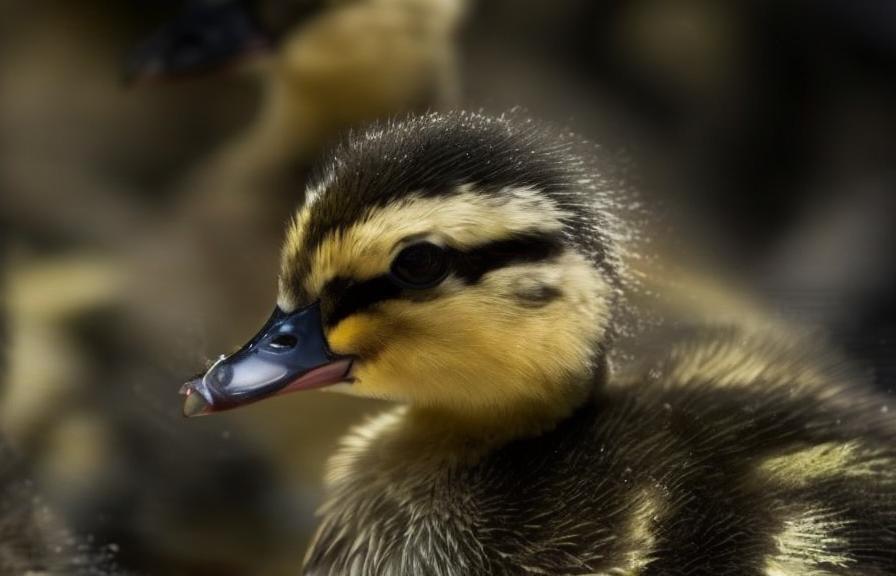
Cayuga ducks are generally hardy birds that are resistant to many common poultry diseases. However, they can still be susceptible to certain health issues if proper care is not provided. One common health issue in ducks is respiratory infections, which can be caused by poor ventilation or exposure to damp or drafty conditions. It is important to provide ducks with a clean and well-ventilated living environment to prevent respiratory issues.
Another common health issue in ducks is parasites such as mites and lice, which can cause irritation and discomfort. Regular health checks and preventative measures such as parasite control are important for maintaining the health of Cayuga ducks. Additionally, ducks can be susceptible to injuries such as cuts or scrapes, which should be treated promptly to prevent infection.
Overall, providing proper care, nutrition, and a clean living environment are essential for preventing common health issues in Cayuga ducks. Regular health checks and prompt treatment of any issues that arise are important for maintaining the health and well-being of these beautiful birds.
Uses and Benefits of Cayuga Ducks
Cayuga ducks have several uses and benefits that make them a valuable addition to any farm or backyard flock. One of the primary uses of Cayuga ducks is for meat production. They are known for their flavorful meat, which is darker than that of other duck breeds due to their dark plumage. Their meat is prized by chefs and home cooks alike for its rich flavor and tender texture.
In addition to meat production, Cayuga ducks are also valued for their egg-laying abilities. They are good layers, capable of producing around 100-150 eggs per year. Their eggs have dark shells that range from black to dark gray in color, making them visually striking and unique. The eggs are also known for their rich flavor and high nutritional value.
Cayuga ducks also have benefits beyond meat and egg production. They are excellent foragers and can help control pests such as slugs, snails, and insects in the garden or on the farm. Their manure is also valuable as a natural fertilizer for gardens and crops.
Overall, Cayuga ducks have several uses and benefits that make them a valuable addition to any farm or backyard flock. Whether it’s for meat production, egg-laying abilities, pest control, or natural fertilizer, these beautiful birds have much to offer to those who choose to raise them.
If you’re interested in learning more about raising Cayuga duck breeds, you might also want to check out an article on PoultryWizard about turning a shed into a chicken coop. This article provides valuable insights into creating a suitable environment for poultry, which can be beneficial for duck breeds like Cayugas. You can read the full article here.
FAQs
What are Cayuga duck breeds?
Cayuga ducks are a domestic breed of duck that originated in the United States. They are known for their iridescent green-black plumage and are popular for their calm and friendly temperament.
What is the average size of Cayuga ducks?
Cayuga ducks are medium-sized ducks, with drakes (males) weighing around 7-8 pounds and hens (females) weighing around 6-7 pounds.
What is the lifespan of Cayuga ducks?
Cayuga ducks have an average lifespan of 7-12 years, depending on their living conditions and level of care.
What are the typical characteristics of Cayuga ducks?
Cayuga ducks are known for their iridescent green-black plumage, which can appear almost black in certain lighting. They have a calm and friendly temperament, making them popular for backyard flocks.
What type of environment do Cayuga ducks thrive in?
Cayuga ducks thrive in a variety of environments, including ponds, lakes, and backyard settings with access to water for swimming and foraging.
What is the egg-laying capacity of Cayuga ducks?
Cayuga ducks are known for their excellent egg-laying capabilities, with hens typically laying around 100-150 eggs per year. Their eggs are a dark gray or black color, which lightens as they are laid.
Are Cayuga ducks good for meat production?
Cayuga ducks are also valued for their meat, as they have a good meat-to-bone ratio and produce flavorful, dark meat. They are often raised for both egg and meat production.
Meet Walter, the feathered-friend fanatic of Florida! Nestled in the sunshine state, Walter struts through life with his feathered companions, clucking his way to happiness. With a coop that’s fancier than a five-star hotel, he’s the Don Juan of the chicken world. When he’s not teaching his hens to do the cha-cha, you’ll find him in a heated debate with his prized rooster, Sir Clucks-a-Lot. Walter’s poultry passion is no yolk; he’s the sunny-side-up guy you never knew you needed in your flock of friends!

